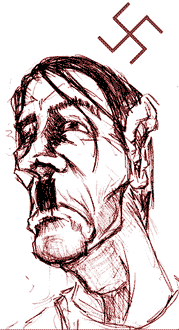 |
 |
 |
 |
 |
 |
 |
 |
 |
 |
 |
 |
 |
 |
 |
 |
 |
 |
 |
 |
 |
 |
 |
 |
 |
 |
 |
 |
 |
 |
 |
 |
 |
 |
 |
|
|
My Grandparents' Early Years |
|
|
|
David Goeckeler |
|
|
| The early 1930's were one of America's scariest periods. The economy hit rock bottom and left millions of Americans without a job. Many of these people were forced into living in shantytowns called "Hoovervilles." The United States was on the brink of disaster. Karl Marx's prediction that capitalism would ultimately fail was looking to be true, and because of this, some Americans thought communism would become the answer. My grandparents were all fortunate enough to have food and shelter during the depression. They were not evicted from their homes or forced to sell their property. However, The Great Depression had far reaching effects. |
|
|
|
It spread to Europe and indirectly contributed to the rise of Hitler. Bank robberies became more prevalent as American society weakened. The only thing that calmed some people down was the radio. It helped people to forget their problems and take a break from every day stress. Unfortunately, the people hit hardest were often without such luxuries. The Great Depression affected the vast majority of Americans. |
|
|
| Grandpa Heidema |
|
|
| David Heidema, my maternal grandfather, was born into a family of four March 9, 1919. In time, his family grew to ten, with five males and five females. He and his siblings did fieldwork on their farm in Manhatten, Montana. He also worked in the kitchen often because his mother was constantly sick or pregnant. His modest farmhouse only had three bedrooms. One room was for his parents, one room was for the boys, and the last room was for the girls. Grandpa didn't know English well until he went to school because his parents, born in Holland, spoke nothing but their native language. One day while playing "riddle riddle ree" at school, an equivalent to "I spy," Grandpa described something that was "long, black, and ties." |
|
|
| The kids in his class guessed he was describing shoelaces. Grandpa emphatically told them that they were wrong. He was describing "veters" (Dutch equivalence to shoelaces). His siblings who knew better just laughed at him. Grandpa"s family moved closer to Billings, Montana when he was nine. His entire family worked hard on the farm and was raised in the New Apostolic Faith. |
|
|
| Grandma Heidema |
|
|
|
Nellie Heidema, named after her mother Nell, was born January 23rd, 1921. Nellie was a distant cousin of David and had a similar childhood to him.� Her family of 13 raised sugar beats on a farm in Montana. Around World War II, the Heidemas had Japanese-American farmhands working for them. They were guarded (by whom I do not know) while they worked and were given only bread and water. My great grandma Nell felt sorry for the farmhands and snuck pots of food past the guards. Grandma had polio and had to relearn to walk at the age of two. She enjoyed raising chicks that she entered into local fair competitions, and once even caught her hair on fire while walking near a gas lamp in her farm home. |
|
|
| "...[A]bout 68 percent of World War II women ultimately finished their high school education." (Sheehy). Grandma loved learning, but unfortunately was among the 32 percent of women who didn't complete High School. She was needed on the farm. However, when she was a teen, she tutored a boy who later became a Montana state senator. During the depression, she had one toy, a doll, and only had one dress. She washed it Saturday and wore it for the whole week. Grandma was also raised New Apostolic. Although neither of my grandparents had much, both David and Nellie always had food because they lived on stable farms. |
|
|
| Grandpa Goeckeler |
|
|
| Paul Goeckeler, my paternal grandpa, was born January 31st 1930. His mother and German born father raised him along with his three siblings, David, Jane, and Anna. The economy was still slow due to the depression, so money was tight for a family of six living in Kansas City. Grandpa recalled, " We couldn't afford a car so my dad always got a ride to work from Deacon Kaiser," (a deacon in the New Apostolic Church the Goeckelers met). Nothing was wasted during the 1930's. Grandpa's father, Karl, brought home 100-pound flour sacks home from his bakery to use as bed sheets. They also occasionally used bones from the butcher shop to flavor broth. |
|
|
|
"This was just on occasion to stretch our food supply," Grandpa commented. Work was sparse during the depression so Karl Goeckeler could only work as� a fill-in baker for two or three days a week during the early 1930's. Eventually Karl bought a bakery of his own where grandpa often helped. Paul liked playing with Tonka Toys and enjoyed playing sports with his brother, especially tennis, as he grew up. |
|
|
|
Grandma Goeckeler |
|
|
|
Nadine Leverton was born July 26th, 1931, in Kansas City. She loved playing with Shirley Temple and Betsy Wetsy dolls, but often had to play alone because her older sister, Mil, thought that the toys were pointless and preferred reading instead. " I was shy and unsure of myself when I was small," Grandma recollected after telling a story in which she cried after saying her "ABC's" incorrectly. If she was good at school and didn't cry, she would get a penny a week to spend at the candy store. Grandma liked jawbreakers, but they were two for a nickel so she had to save for those. Grandma often went to the movies with her sister. |
|
|
| Back then, movies were a quarter or less, and refreshments cost five cents. Grandma and Aunt Mil were jokesters when they were young. The Levertons bought one of the first Philco remote controlled radios on the market. The two girls told their aunts that the radio station would change if they told it to. The aunts were amazed when the radio "heard" them. |
|
|
| Radio in the 30's |
|
|
| People all over loved to tune into radio stations as a recreational pastime and as a way to forget about economic troubles. Some of the radio shows had messages behind them such as "Little Orphan Annie," "Flash Gordon," and "Jack Armstrong." Little Orphan Annie's excessively wealthy, adoptive father, Daddy Warbucks, often shed his capitalistic ideas to listeners. The creator of Annie, Harold Gray, also entailed his ideas about labor leaders and liberal politicians in the show. Flash Gordon, a favorite of young boys, was stuck on the planet Mongo and was always fighting Ming the Merciless. "Mongo was ruled by yellow skinned, almond-eyed Ming the Merciless" (Brash 70).� |
|
|
| During the 30's, Japanese power was rising in Asia. The hidden message of Flash Gordon was to be scared of Orientals. Jack Armstrong, the all American boy, sent the message that if listeners were kind, honest, forthright citizens, prosperity would be granted to them. Jack also sold Wheaties by telling his audience how they helped him win high school football games (Brash 72). Other shows were primarily for fun, such as "Buck Rogers" with its futuristic capers, and "Tarzan" with its wild jungle adventures. Grandma and Aunt Mil enjoyed listening to "Inner Sanctum," a scary mystery program. They had to listen to it with the lights turned off and blankets covering their heads. |
|
|
|
Pretty Boy Floyd |
|
|
| Charles Arthur Floyd also caught attention during the 30's. He was one of America's most notorious bank robbers during the 30's. He robbed banks during the depression before peoples' money was federally insured. If banks didn't have enough cash on hand, it was possible that they would have to close. That was not a concern of "Pretty Boy Floyd" though. He took up crime because he was impoverished in Oklahoma's Dustbowl. He robbed banks all the way from his home state to Ohio. Floyd had a Robin Hood image to people in the Dustbowl region. He often gave handouts to poor farmers and gave money to people who would harbor him from the police. |
|
|
| Charles destroyed mortgage papers of other people so that banks couldn't sell their land and even tangled with the law in Kansas City, where he committed murder. He was always on the run and escaped imprisonment in 1930. FBI agents trapped, shot, and killed Pretty Boy Floyd in an Ohio field in 1934 (Floyd). |
|
|
| The Evil Axis� |
|
|
| One of the most monumental happenings of the 30's was the Axis' rise to power. The depression was not only affecting the United States, it was also affecting Europe and primarily Germany. Germany was still rebuilding from its defeat in WWI both economically and morally. Hitler appealed to the desperate Germans by promising quick economic recovery and the building of a great nation. By 1930, the Nazis were the second largest political party in Germany (Grant 154). Hitler's promises and emotionally charged speeches allowed him to rise to the position of chancellor of Germany. Hitler stopped at nothing, including murder, to obtain dictatorship. |
|
|
| " In all 1000 men were picked up, driven to local prisons and shot," (Luckiuk). This happened June, 30th, 1934, and was known as Hitler's Night of the Long Knives. He killed people who opposed him and even friends who helped him along the way. He viewed his friends as nothing more than obstacles in his rise to the position of "Furher." Japan invaded a portion of China known as Manchuria. The Japanese were running out of room for their growing population so they felt that it was necessary to have more room to expand. Japan also had very few natural resources, so the Japanese saw Manchuria as an economic boost as well. |
|
|
| They thought that they could become more self-sufficient and wouldn't have to rely on the importations of other countries as much. Through the following years until WWII, Japan continued to attempt capture of additional Chinese land (Perez 139). |
|
|
| Overall, the thirties were a rough time for most Americans. Many people were hungry, jobless, or homeless. Banks were closing left and right and they "swallowed" families' entire life savings with them. People feared that capitalism was failing them and feared the rising of other world powers. The Great Depression had affected the vast majority of Americans. FDR calmed many Americans by introducing the "New Deal," giving work to many destitute Americans. He also held� "fireside chats" over the radio that made most Americans feel at ease and as though they were personal friends with the President. Soon after, economic prosperity and capitalism thrived once again in the United States. |
|
|
|
 |
|
 |
|
|
|
 |
|
|
|
 |
|
|
|
|
|
|
|
|
Family Tree |
|
|
|
Photos |
|
|
|
|
|
|
|
|
|
|
|
|
|
|
|
|
|
|
|
|
|
|
 |
|
|
|
|
 |
|
|
|
|
|
 |
|
|
|
|
|
|
|
|
|
|
|





